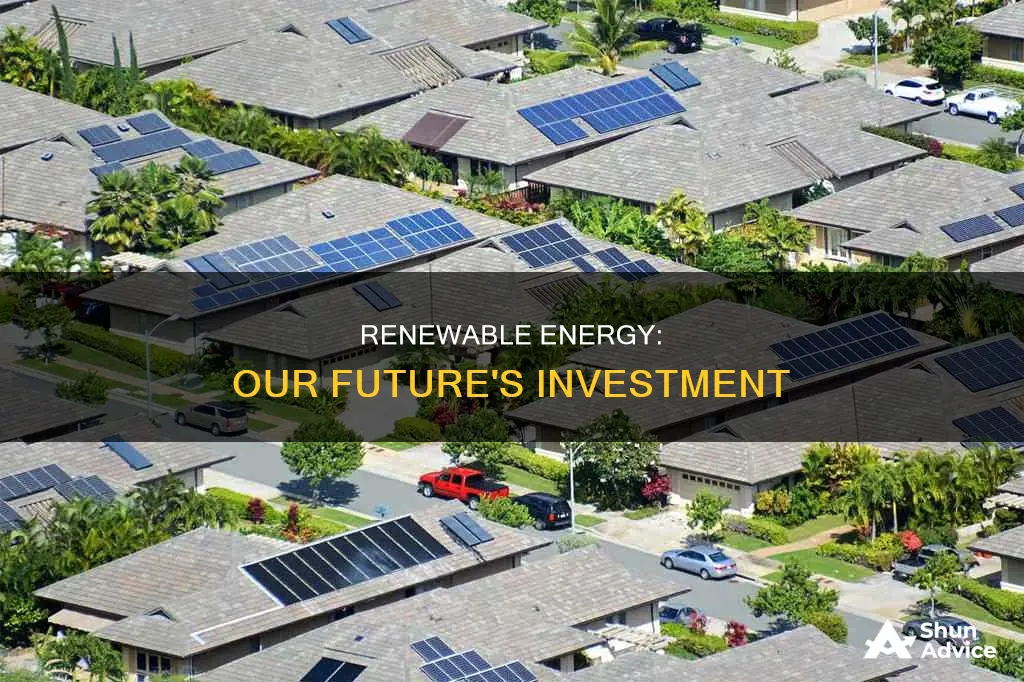
Investing in renewable energy is essential for rebuilding the economy and protecting the planet. As countries strive to reduce carbon emissions and combat climate change, the demand for clean energy sources is rising. Renewable energy investments offer significantly higher returns than fossil fuels, and the job market in this sector is growing rapidly. Additionally, renewable energy reduces air pollution, improves public health, and protects communities from the dangerous effects of climate change. With governments and companies shifting their focus towards clean energy, investing in renewable energy is a wise choice for those looking to profit from this growing market while also contributing to a sustainable future.
What You'll Learn
- Clean energy jobs are increasing rapidly
- Clean energy investments create three times more jobs than fossil fuels
- Clean energy reduces air pollution, making people less vulnerable to disease
- Clean energy yields an economic return 3 to 8 times higher than the initial investment
- Clean energy is popular on both sides of the aisle

Clean energy jobs are increasing rapidly
The number of jobs in the clean energy sector has been growing faster than in the overall economy. Between 2015 and 2019, the clean energy industry added jobs 70% faster than the overall US economy. By 2019, 3.4 million Americans across all 50 states worked in clean energy occupations, outnumbering those working in real estate, banking, or agriculture.
Clean energy jobs now account for more than half of all energy sector jobs. In 2021, 1.3 million new clean energy jobs were added, bringing the total number of people working in the global energy sector to more than 65 million. This growth is driven by increasing investment in clean energy technologies and the race to net-zero emissions.
The expansion of clean energy industries is generating upstream jobs, particularly in critical mineral mining. The Asia-Pacific region, with its access to lower-cost labour, has become a hub for clean energy manufacturing, especially in solar technologies, electric vehicles, and batteries.
The demand for workers in clean energy is expected to continue, with growth in new jobs outpacing declines in fossil fuel roles. To reach net-zero emissions targets, the world will need to create millions of new clean energy jobs by 2030. This will require retraining and educational programs to ensure workers have the necessary skills, as skilled labour shortages are already being cited as a barrier to ramping up activity.
Wealthy Investing: Should They Continue?
You may want to see also

Clean energy investments create three times more jobs than fossil fuels
Firstly, the economic indicators for clean energy are promising. Businesses have realised that sustainable development is key to long-term success and investment, and this has resulted in a 12% faster growth rate than the US economy. The cost of solar and wind products has also dropped, making them more affordable and attractive to consumers. This has led to a growing market for clean energy, with more jobs being created to meet demand.
Secondly, the shift towards clean energy is being driven by the need to reduce greenhouse gas emissions and combat climate change. Many nations are seeking to reach net-zero carbon emissions by 2050, and this provides a market opportunity for investors. The global investment in transitional technologies reached $1.8 trillion in 2023, and it is estimated that investments in renewables will need to triple in the coming years to meet emissions targets. This increasing investment in the renewable energy sector has the potential to create a significant number of jobs.
Thirdly, the clean energy industry offers well-paid and stable jobs, particularly in renewable energy sources such as solar and wind power. These jobs are often available to workers without college degrees, providing opportunities for those with lower educational attainment. Clean energy jobs can also lead to higher wages, with workers in these sectors earning 8%-19% more than their peers in other industries.
Finally, the growth of the clean energy industry is not limited to certain political affiliations or geographical locations. Clean energy jobs are available across America, including in fossil fuel-heavy states, and the industry is expected to continue growing, creating more jobs and economic opportunities.
In conclusion, clean energy investments offer a triple benefit: they help combat climate change, provide well-paid and stable jobs, and stimulate economic growth. With the increasing demand for renewable energy sources and the promising economic indicators, it is clear that investing in clean energy creates significantly more jobs than investing in fossil fuels.
People Prefer Spending Over Saving and Investing
You may want to see also

Clean energy reduces air pollution, making people less vulnerable to disease
The transportation and energy sectors, including cars, buses, trucks, coal-fired power plants, and refineries, are some of the largest sources of harmful air pollution in the US. These sources of air pollution increase the rates of asthma, heart disease, and other health issues. Air pollution is linked to about 4.2 million deaths every year. A recent Harvard analysis also showed that people living in contaminated cities were more likely to die of COVID-19.
Clean energy technologies, such as wind, solar, and hydroelectric systems, generate electricity with little to no air pollution emissions. Geothermal and biomass systems emit some air pollutants, but their total air emissions are generally much lower than those of coal- and natural gas-fired power plants.
Wind energy, for example, is created using wind turbines that can be placed anywhere with high-speed winds, from hilltops to open water for offshore wind. Wind turbines have no direct air pollution emissions and do not require water for cooling. Similarly, solar energy uses solar cells or photovoltaic cells made from silicon or other materials that transform sunlight into electricity without producing air pollutants or greenhouse gas emissions.
By transitioning to clean energy sources, we can reduce air pollution and protect the health of all Americans, both now and in the future.
Who Invests and Why?
You may want to see also

Clean energy yields an economic return 3 to 8 times higher than the initial investment
Clean energy is not only a more sustainable alternative to fossil fuels but also a more profitable one. Investing in renewable energy sources such as solar, wind, or hydroelectric power can offer a much higher economic return than the initial investment.
The International Renewable Energy Agency's (IRENA) 2020 Global Renewables Outlook highlights the significant socioeconomic benefits of transitioning to clean energy. IRENA's "Transforming Energy Scenario" outlines an ambitious yet realistic plan to limit the global temperature rise to well below 2 degrees Celsius. While this scenario would cost $19 trillion more than a business-as-usual approach, it would bring about $50-142 trillion in benefits by 2050, increasing the world's GDP by 2.4%.
Furthermore, IRENA's "Deeper Decarbonization Perspective" provides a roadmap to achieving net-zero emissions by 2050-2060. This perspective would require an investment of $35-45 trillion but would yield even higher returns, with cumulative savings of $62-169 trillion when considering the reduced health and social costs associated with lower air pollution levels.
The economic advantages of clean energy investments are not limited to the energy sector alone. By investing in renewable energy, countries can also mitigate the financial risks posed by climate change. For example, data from the WRI's Aqueduct platform reveals that by 2030, coastal flooding driven by climate change will impact 2.5 million people and $42 billion in urban property annually.
Clean energy investments can also create numerous job opportunities. Under IRENA's "Transforming Energy Scenario," the number of renewable energy jobs worldwide could more than triple, reaching 42 million by 2050.
In summary, investing in clean energy offers a compelling economic opportunity, with potential returns far exceeding the initial investment. By embracing renewable energy sources, countries can not only address the urgent challenge of climate change but also unlock significant socioeconomic benefits, including enhanced GDP growth, reduced climate change risks, and the creation of millions of new jobs.
Renewables: Why the Reluctance?
You may want to see also

Clean energy is popular on both sides of the aisle
The benefits of investing in clean energy are clear. Clean energy jobs were already growing rapidly before the COVID-19 pandemic, with the clean energy sector adding jobs 70% faster than the overall US economy from 2015 to 2019. Investing in clean energy and clean transportation can generate substantial returns in job growth and emissions reductions. A report from the Environmental Defense Fund and Datu found that severe weather disasters have increased fourfold since 1980, costing US taxpayers $1.75 trillion. Taking strong action to curb emissions will help to reduce the frequency and severity of these weather events and the costs associated with them.
Clean energy is also a smart economic investment. A study by Bloomberg New Energy Finance found that global investment in transitional technologies reached $1.77 trillion in 2023. To stay on track for net-zero emissions, investment in transitional energy will need to reach about $4.8 trillion per year between 2024 and 2030. This represents a significant market opportunity for investors.
In addition, clean energy yields higher economic returns than investments in fossil fuels. A report by Imperial College London found that renewable energy investments in the US yielded returns of 200.3% over a five-year period, compared to 97.2% for fossil fuels. Clean energy investments also tend to be less volatile, holding up well during economic downturns.
There is also growing bipartisan support for clean energy among federal policymakers and candidates. In July, House lawmakers passed the $1.5 trillion Moving Forward Act, which includes $70 billion in clean energy investments, tax credit extenders, and provisions to curb emissions. A group of Senate Republicans has also voiced support for policies that will bolster jobs and innovation in the clean energy economy. Polling reflects widespread bipartisan support for clean energy, with 66% of voters believing that clean energy investments will strengthen the US economy and benefit workers.
Rich People's Investment Strategies
You may want to see also
Frequently asked questions
Renewable energy is the future. With the world transitioning away from fossil fuels, investing in renewable energy sources like wind, solar, and hydropower offers a great market opportunity.
Investing in renewable energy can bring substantial returns, with clean energy jobs growing rapidly and creating more jobs than an equivalent investment in fossil fuels. It also helps to reduce air pollution, making people less vulnerable to diseases.
Renewable energy can boost the economy by creating new jobs and reducing energy costs for citizens. It also helps countries achieve their climate targets and reduces the financial and other risks associated with climate change.
Some examples of successful renewable energy investments include wind energy stocks, such as NextEra Energy, General Electric, and Vestas Wind Systems, as well as solar energy ETFs like Invesco Solar ETF (TAN) and First Trust Global Wind Energy ETF (FAN).







